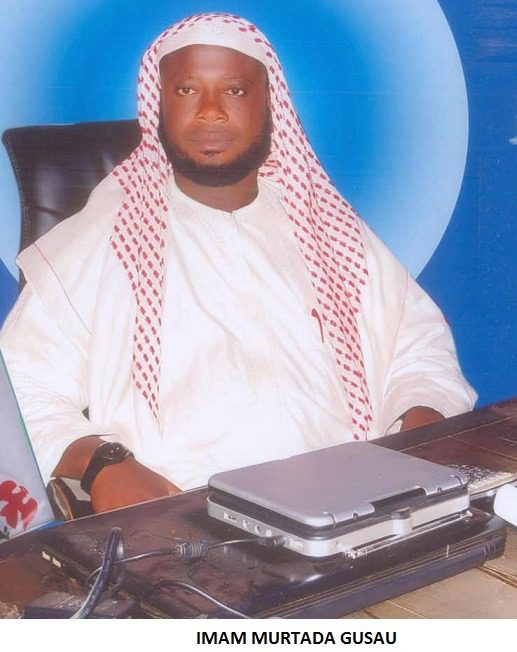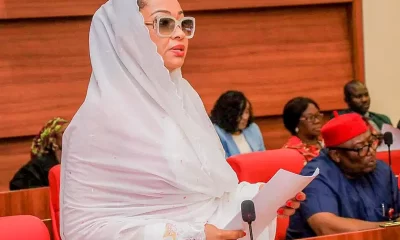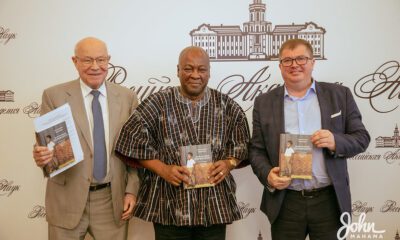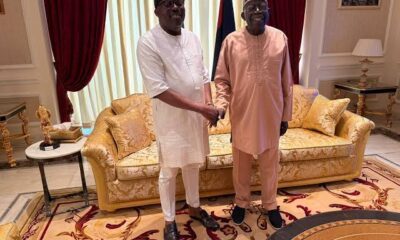National Issues
Buhari’s 100 Days and the Quest for Safeguarding the Trust (Amanah) -By Murtada Gusau


First Sermon:
In the Name of Allah, the Most Beneficent, the Most Merciful
All praise is for Allah (SWT) who put the Trust (Amanah) in the hearts of men after the heavens, earth and mountains had declined to bear it. He put the trust in the hearts of the children of Adam, males and females, because he had created within them intellect and reasoning, with which they understood, and hearts and souls, with which they were guided. For this they endured the trust with all the risks it entailed. They did so to attain the level of the righteous believers as they safeguard and convey this trust (Amanah). Yet, if they waste it and neglect it, they shall fall to the lowest of the low.
I bear witness that there is no god worthy of worship except Allah Alone, having no partners. He is the God of the first of the people and the last of the people. He created and perfected His creation. Verily, He is the Judge and the All-Wise.
I bear witness that Muhammad is His slave and Messenger who conveyed the message, fulfilled his trust in the most perfect manner, and worshipped his Lord until the time of his death. May the peace and blessings of Allah (SWT) be upon him, his family, his Companions and everyone who follows on their footsteps until the Day of Recompense.
My Respected people!
Today’s Khutbah (Sermon) is a tribute to our incorruptible, just, honest, brave, intelligent, reasonable, sensible, no-nonsense, globally revered and universally acknowledged leader, President Muhammadu Buhari, as well as our state governors, as they have recently clocked 100 days in office. The main purpose of this Sermon is to remind them and fellow Nigerians that public office is a trust (Amanah), and they are all going to be held accountable for their offices, either here (by God, EFCC, ICPC or CCB) or hereafter (by God alone).
O servants of Allah!
Fear Allah, the Most High, and fulfill the trust you were entrusted with. Allah (SWT) has offered the Amanah (the trust) to the heavens, the earth and the mountains, but they declined to bear it and were afraid of it. Yet, man agreed to bear it; he was indeed unjust and ignorant.
O servants of Allah!
Fulfill the trust that you agreed to bear by doing what Allah (SWT) ordered you to do. Worship Him and fulfill His rights over you. Do not betray Allah (SWT) and His Messenger, nor betray knowingly the trusts that were entrusted to you. Exceeding the proper bounds of these trusts, as well as neglecting them, leads to betraying them. Betrayal of trust is a defect in the faith and a cause for loss and deprivation. The Prophet (SAW) said:
“He has no faith who cannot keep a trust (Amanah).”
He also said:
“The signs of a hypocrite are three: when he speaks, he tells lies; when he promises, he reneges; and when he is entrusted (with something), he betrays (it). Even if he prays, fasts and claims to be a Muslim (he still is a hypocrite).”
The Prophet (SAW) also said:
“When Allah gathers the first of the people and last of the people on the Day of Resurrections, he will raise a flag for every betrayer; then it will be said: this is the betrayal of such and such a person.”
To his regret and disgrace, this flag will be raised for the betrayer to expose him in front of all the people.
O Muslims! O Nigerians!
Trust is in worship, transactions and behaviour. Keeping the trust in worship is by obeying Allah (SWT) with pure intention, following His Messenger (SAW) abiding by His orders, avoiding His prohibitions, and fearing Him openly and secretly. You should fear Allah (SWT) regardless of whether people can see you or not. So do not be one of those who fear Him in the Open, but when you are alone you disobey Him. That is indeed Ar-Riyaa’ (being dishonest in your intention by showing off). Do you not know that Allah (SWT) knows the fraud of the eyes and all that the breasts conceal? Do you not know that Allah (SWT) disapproves of those who behave that way? He (SWT) says:
“Or do they think that We hear not their secrets and their private counsel? Yes, (we do) and Our Messengers are by them, to record.” (Az-Zukhruf, 43:80)
“Know they not that Allah know what they conceal and what they reveal?” (Al-Baqarah, 2: 77)
“They may hide (their crimes) from men, but they cannot hide (them) from Allah; for He is with them (by His Knowledge), when they plot by night in words that He does not approve. And Allah ever encompasses what they do.” (An-Nisaa’, 4:108)
In behaviour, to keep the trust is to treat people the way you like them to treat you, being sincere to you, as you would do. It is also to safeguard their rights, whether related to money or other things, which you are being entrusted with. Between a husband and a wife, keeping the trust is that each one of them should safeguard the other’s property and secrets. Every husband and every wife must keep what occurs between them in terms of the intimate relations secret. No one else should know about it. In an authentic Hadith, the Prophet (SAW) was reported saying:
“One of the worst people on the Day of Judgement is the man who would have intimate relations with his wife and she would have the same with him, then both of them or one of them would disclose the secrets of his partner. (Meaning: what had occurred between them).”
The husband and wife would trust one another not to disclose their private and intimate relationship between them, yet one of them would betray this trust. Or one of the two would confide something what he or she would not like anyone else to know, to the other, however the other spouse would disclose it to other people. This is not only applied to couples, it also applies to friends in terms of one confiding something to another. In this regard, a narration states that:
“If a man tells another something and turns his (face) around, then (this thing) is a trust (Amanah).”
As he would not turn his face around if this talk was not a secret that he wanted no one to hear.
Trust is also involved in transactions and commercial exchange, which include buying, selling and renting. The seller should not betray the buyer in terms of increasing the price, covering the defects of the commodity, cheating on describing the commodity or reducing the weight or measure. On the other hand, the buyer must not betray the seller by taking some of the price off, defaulting on the debt, or procrastinating in paying his dues while he is able to pay. The rentee must not betray the renter by taking away some of the utilities or facilities that were agreed on to be provided in the rent contract. Likewise, the tenant should not cheat the renter by reducing the rent amount, declining to pay it or destroying something in the rented item whether a house, a shop, a machine, or a vehicle.
In proxies, the trustee must keep the trust by taking on all the responsibilities involved in this proxy. He should do everything that benefits his client. For instance, a trustee should not sell the commodity (the object of the Proxy) for a lower price than its real value for the purpose of pleasing the buyer. If the proxy involves buying something, the trustee must not buy it for a price that is higher than its real value just to please the seller. Every person in charge of any department or office in government or private companies or holding any responsibility is a trustee. He, therefore, must safeguard this trust. A president is a trustee, a vice president is a trustee, the governors are trustees, a Sultan is a trustee, a senate president is a trustee, a speaker of the House of Representative is a trustee, the senators, and all the members of the House of Representatives are trustees, the Shehus are trustees, the Emirs are trustees and the ministers are trustees. The permanent secretaries are trustees, the Obas are trustees, the Ohinoyis are trustees, the local government chairmen are trustees, and the service chiefs are trustees. A judge is a trustee, the directors and managers of any departments are also trustees. The Imams, Sheikhs, Malams and Alfas are all trustees. They all must take on the responsibilities that are involved in these trusts and manage them in a manner that will benefit and safeguard these trusts, all according to their utmost abilities. The guardians of orphans, the trustees of Waqf (administrators of Islamic endowments), and the legal guardians that implement the wills are all trustees who must attend to the responsibilities of their trusts to the best of their abilities.
Trusts are also involved in the education process at schools. Those who are in charge, whether they are vice chancellors, directors, supervisors, lecturers or principals, should keep in mind the issue of fulfilling their trusts and duties. This may be done by selecting useful textbooks and hiring the pious and righteous teachers, who care about teaching the students every useful material, be it religious studies, science and technology and other subjects and looking after them in terms of behaviour, discipline, conduct and religious duties. Another trust should also be kept in this regard; that is how to protect the school examinations from being tampered with and to insure the fair preparation of these examinations. For example, the level of understanding and learning of the students must be taken into consideration by those who prepare the examinations, so that the examinations will suit the student’s intellectual and learning abilities.
Two kinds of examinations might harm and cause more detriment than good. First, the examination that is beyond the students’ level of learning and understanding and second is the examination, which is less than their level. The first may make many students fail and thus waste a whole year and the second may hurt the general level of education for the whole country. During the examination, the supervisors must be alert regarding any attempt at cheating among the students. Keeping the trusts in education also means that no student shall receive preferential treatment for any reason, because if this happens, the student himself will be the one getting hurt. All of the students in the examination hall are the responsibility and the trust of the supervisor. According to him, all the students are equal. No special attention should be given to any of them at the expense of the other students.
In the process of correcting and marking these examinations, the correctors must be accurate and the correcting process must be done according to the standards of the system, so that no one will be oppressed or mistreated at the expense of the others. By this each student will get the result he earned.
If we keep this trust (Amanah) at all the three of its levels, this will benefit the whole nation. This will also benefit every person involved in the process; the supervisors in charge as they fulfill their duties and the students who will thereby reach the high level of education and knowledge and not just receive a certificate or a title. Keeping the trust in the end will benefit the knowledge itself in that it will be strengthened and increased.
The number of students who pass examinations shall not be that important because the main concern should be quality, not quantity. If there are fewer students that pass this year, next year there will be more, because the students will take the matter more seriously.
May Allah (SWT) guide us to fulfill the trust and successfully bear the responsibilities we have upon us. May he prevent us from falling into betraying the trust or neglecting it. With this, I conclude and ask Allah to forgive our sins. Seek his forgiveness, for He is the All-Forgiving, the All-Merciful.
Second Sermon:
All praise is for Allah who ordered us to perform the secretariat. I bear witness that none has the right to be worshipped except Allah. Our Lord promised honest and secretariat people with paradise as a reward for them. I bear witness that Prophet Muhammad (SAW) is our Messenger who was the most secretariat person. Allah said:
“You who believe, fear from Allah and keep duty for him, and let everyone look for what he had sent for tomorrow. (Al-Hashr, 59:18)
My Respected People!
Keeping the trust is a super character which makes good trust among people. Allah said:
“Allah commands you that you should return back the trust to those whom they are due.” (An-Nisaa’, 4:58)
He the Most High also said:
“Those who are faithfully true to their trusts (Amanaat).” (Al-Ma’aarij, 70:32)
Our beloved Prophet Muhammad (SAW) also joined between the faith and trust as he said:
“The believer is the one that people feel safe of their wealth and soul with.”
Muslim’s trust is a real indicator of his faith: The Messenger of Allah (SAW) said:
“No faith for the dishonest.”
Prophet Muhammad (SAW) also said:
“Verily, I am to you a Messenger worthy of all trust.” (Ad-Dukhaan, 44:18)
“Verily the best of men for you to hire, is the strong and trustworthy” (Al-Qasas, 28:26)
Before revealing to our Messenger, because of his trust and Amanah people used to call him “The Trustful (Al-Ameen).”
Also trust has qualified the Prophet Yusuf to be over the storehouse of the land. Allah said:
“And the king said: Bring him to me that I may attach him to myself.” (Yusuf, 12:54)
O Brothers and Sisters!
The characteristic of trust was common in our Messenger’s life and for that Khadeejah (May Allah bless her) chose him as a husband.
O Believers! O Nigerians!
This trust (Amanah) included many things in our life:
– Worship is trust, so we must offer it in the best way;
– Children are trusts, so the parent must take care of them and advise them;
– Students are trusts, so the teacher must increase their knowledge;
– Leadership is trust, so the leaders must lead people honestly and sincerely;
– Wealth is trust, so we must earn halal and spend it in the right way and give charity and zakaat;
– Job is a trust, so the worker must be sincere;
– Neighborhood is a trust, so we must respect our neighbours;
– Family relations are trusts, so we must maintain them.
I pray for Allah to grant us and to help us keeping the trust and paying it to whom they are due, ameen.
I pray that Allah (SWT) in His Infinite Mercy to forgive the late Chief Imam of Sheikh Othman Bin Fodio Mosque Sokoto, Imam Attahiru Alhaji Idris his sins, shortcomings, and failings. He who died on Monday September 7, 2015 after a long and protracted illness due to an accident, at the age of 75. May Allah (SWT) grant him Jannatul Firdaus. I also pray that He the All-Mighty forgive the late Hajiya Fatima ‘Yar Gado, the wife of the late former Sultan of Sokoto, Alhaji Muhammadu Maccido. She died on Sunday evening, September 6, 2015. She is the mother of Ubandoma Malami Maccido, Sarkin Gabas and former Damburan Sokoto. May Allah (SWT) have mercy on her and grant her Jannatul Firdaus. And we also mourns the sorrowful exit of the great Nigerian hero, the cop who found Tafawa Balewa and Okotie-Eboh’s bodies, a former police commissioner of old Gongola state, Alhaji Ibrahim Ahmad Babankowa who served in the police since the First Republic. He died on Tuesday, September 8, 2015 in Kano after a brief illness, at the age of 74. May Allah forgive him and grant him Jannatul Firdaus, ameen.
I commiserate with Sultan of Sokoto, the respectful and revered leader of all Nigerian Muslims and President General of the Nigerian Supreme Council for Islamic Affairs (NSCIA), His Eminence Alhaji Muhammad Sa’ad Abubakar III (Mni). And his Royal Highness the Amir (Emir) of Kano, Alhaji Muhammadu Sanusi II. The Sokoto and Kano states Governments, the family of the late Imam Attahiru Alhaji Idris, the late police commissioner Alhaji Ibrahim Babankowa and late Hajiya Fatima ‘Yar Gado, the entire people of Sokoto and Kano States and the Muslim Ummah for these regrettable, irreplaceable and irreparable loses.
I pray that Allah reward them all with paradise and give us the fortitude to bear the loss, ameen.
All praise is due to Allah, the Lord of the Worlds, prayers, peace and Mercy be upon our beloved Prophet Muhammad (SAW), his family and Companions.
This Khutbah, (Friday Sermon) was prepared for delivery today, Jumu’ah Thul-Qidah 27, 1436 A.H (September 11, 2015), by Imam Murtada Muhammad Gusau, the Chief Imam of Nagazi-Uvete Jumu’at Mosque, Okene, Kogi State Nigeria. He can be reached via: 08038289761 (+2348038289761).










